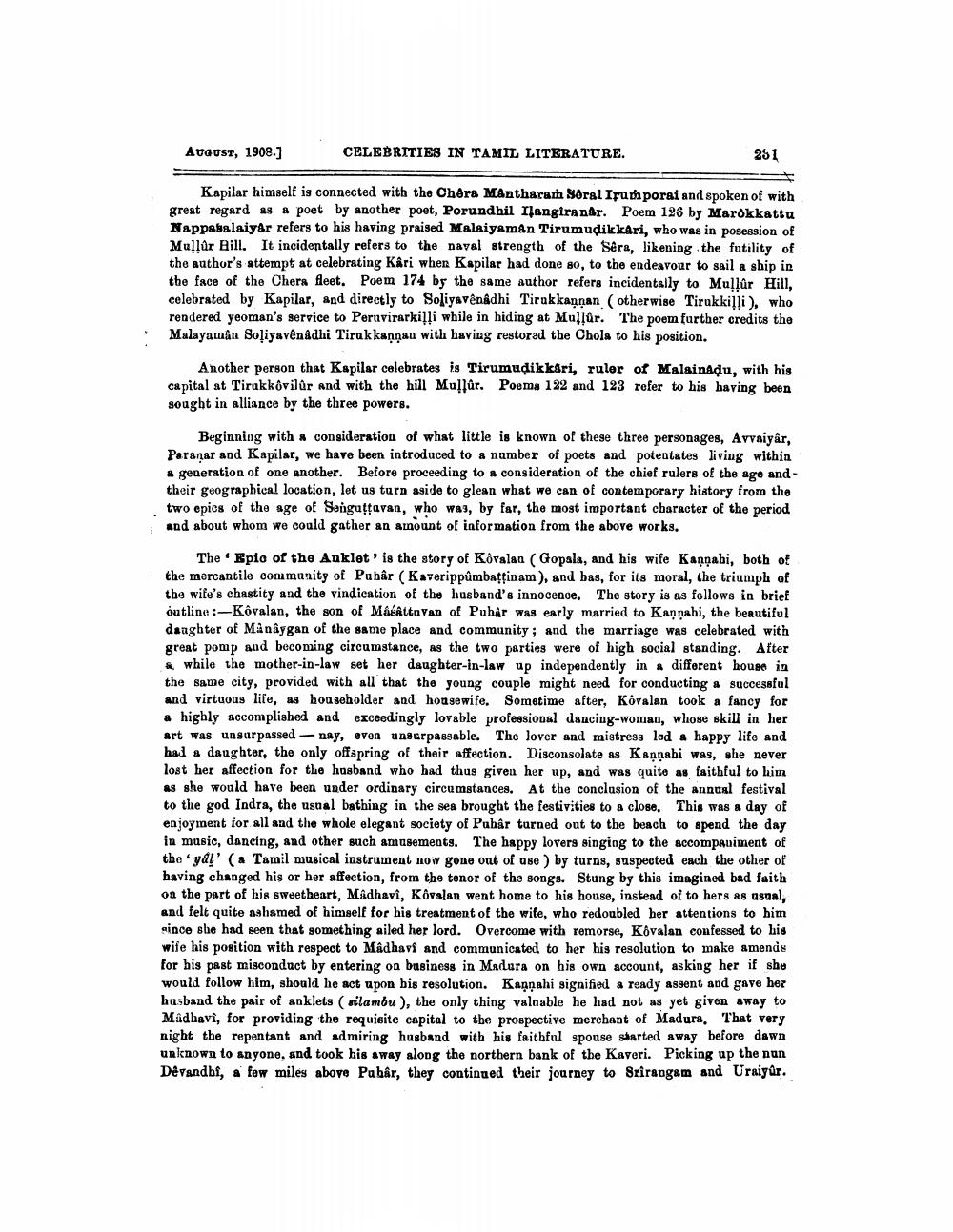________________
AUGUST, 1908.]
CELEBRITIES IN TAMIL LITERATURE.
Kapilar himself is connected with the Chera Mantharam Soral Irum porai and spoken of with great regard as a poet by another poet, Porundhil Ilangiranar. Poem 126 by Marokkattu Nappasalaiyar refers to his having praised Malaiyaman Tirumudikkari, who was in posession of Mullûr Hill. It incidentally refers to the naval strength of the Sêra, likening the futility of the author's attempt at celebrating Kâri when Kapilar had done so, to the endeavour to sail a ship in the face of the Chers fleet. Poem 174 by the same author refers incidentally to Mullûr Hill, celebrated by Kapilar, and directly to Soliyavênâdhi Tirukkannan (otherwise Tirukkilli), who rendered yeoman's service to Peruvirarkilli while in hiding at Mullûr. The poem further credits the Malayamân Soliyavênâdhi Tirukkannan with having restored the Chola to his position.
251
Another person that Kapilar celebrates is Tirumudikkari, ruler of Malainadu, with his capital at Tirukkôvilûr and with the hill Muļļûr. Poems 122 and 123 refer to his having been sought in alliance by the three powers.
Beginning with a consideration of what little is known of these three personages, Avvaiyâr, Paranar and Kapilar, we have been introduced to a number of poets and potentates living within a generation of one another. Before proceeding to a consideration of the chief rulers of the age andtheir geographical location, let us turn aside to glean what we can of contemporary history from the two epics of the age of Senguṭṭuvan, who was, by far, the most important character of the period and about whom we could gather an amount of information from the above works.
The Epic of the Anklet' is the story of Kôvalan (Gopala, and his wife Kannahi, both of the mercantile community of Puhâr (Kaverippûmbaṭṭinam), and bas, for its moral, the triumph of the wife's chastity and the vindication of the husband's innocence. The story is as follows in brief outline:-Kôvalan, the son of Másattavan of Puhar was early married to Kannahi, the beautiful daughter of Manâygan of the same place and community; and the marriage was celebrated with great pomp and becoming circumstance, as the two parties were of high social standing. After while the mother-in-law set her daughter-in-law up independently in a different house in the same city, provided with all that the young couple might need for conducting a successful and virtuous life, as householder and housewife. Sometime after, Kôvalan took a fancy for a highly accomplished and exceedingly lovable professional dancing-woman, whose skill in her art was unsurpassed- nay, even unsurpassable. The lover and mistress led a happy life and had a daughter, the only offspring of their affection. Disconsolate as Kannahi was, she never lost her affection for the husband who had thus given her up, and was quite as faithful to him as she would have been under ordinary circumstances. At the conclusion of the annual festival to the god Indra, the usual bathing in the sea brought the festivities to a close. This was a day of enjoyment for all and the whole elegant society of Puhâr turned out to the beach to spend the day in music, dancing, and other such amusements. The happy lovers singing to the accompaniment of the yal' (a Tamil musical instrument now gone out of use) by turns, suspected each the other of having changed his or her affection, from the tenor of the songs. Stung by this imagined bad faith on the part of his sweetheart, Madhavi, Kôvalan went home to his house, instead of to hers as usual, and felt quite ashamed of himself for his treatment of the wife, who redoubled her attentions to him since she had seen that something ailed her lord. Overcome with remorse, Kôvalan confessed to his wife his position with respect to Madhavi and communicated to her his resolution to make amends for his past misconduct by entering on business in Madura on his own account, asking her if she would follow him, should he act upon his resolution. Kannahi signified a ready assent and gave her husband the pair of anklets (silambu), the only thing valuable he had not as yet given away to Madhavi, for providing the requisite capital to the prospective merchant of Madura. That very night the repentant and admiring husband with his faithful spouse started away before dawn unknown to anyone, and took his away along the northern bank of the Kaveri. Picking up the nun Dêvandhi, a few miles above Pahar, they continued their journey to Srirangam and Uraiyûr.




